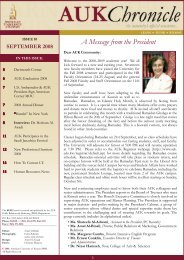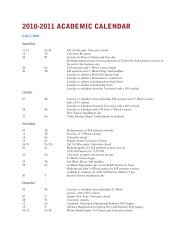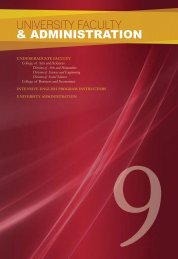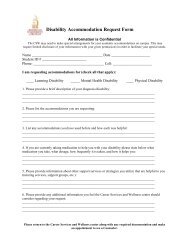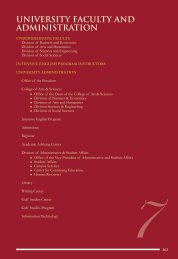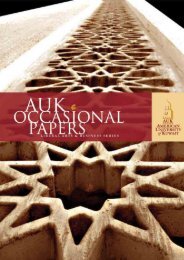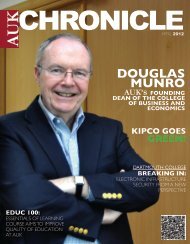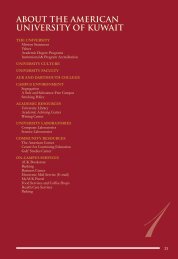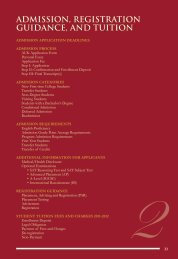Public Health Impacts of Iraq’s 1990 Invasion andOccupation of Kuwait: Phase I Summary of Epidemiologyand Risk Assessment, Harvard School of Public Health,June 29, 2005.Schacter, D. L. (2003). How the Mind Forgets and Remembers:The Seven Sins of Memory. London: Souvenir.Stoller, P. (1995). Embodying Colonial Memories: Spirit Possession,Power, and the Hauka in West Africa. New York and London:Routledge.Taussig, Michael. 1991. The nervous system. New York:Routledge. 1997 The magic of the state. New York: Routledge.Volkan, V. (1998). Bloodlines: From ethnic pride to ethnic terrorism.Boulder, CO: Westview Press.White, G. (2005). Emotive Institutions. In Companion to PsychologicalAnthropology: Modernity and psychocultural change, eds. ConerlyCasey and Robert Edgerton, 241-254. Malden, MA andLondon: Blackwell Publishers, Inc.A Complexity-informedBasis for Social and CulturalChange in the GulfDavid LevickIt can be argued that social and cultural change in anysociety is driven by three factors: resources, powerand identity. Because of the dynamic nature of theinterrelationship between these three factors, theprosperity of all civilizations and societies peaks andwanes. The current profile of the Gulf States has risenin the 20th Century with Western dependence on oil andcould wane when this dependence disappears. This can beexplained through the process of globalization that linksaccess and control of scarce and desired resources withpower and identity (Woog and Dimitrov, 2004).This first decade of the new millennium offers an opportunityfor the Gulf States to take stock of their position and tobe proactive in shaping and investing their current goodfortune in a new basis of power for coming decades.The current and prestigious social and cultural dynamicsof the Gulf States have been due to their access to andcontrol of significant oil reserves upon which much ofthe world depends.While it can be expected that this dependence will continuefor several decades – especially as China rises as a worldeconomic power – economic principles will see alternativesources of power become more viable, thus diminishingthe control the Gulf States have over oil production.What, then, will source the prosperity and wealth of theGulf States and allow them and their people to maintaintheir current identity and status? While still riding thewave of fossil-fuel prosperity, now is an opportune timefor these nations to identify and gain control of accessto the desires resources of the future and thus maintaintheir powerbase among the nations of the world and tomaintain or even enhance their current identity.Given current global debate and trends, the resourcesto be strongly desired by the world’s population in thefuture are likely to be those of water and renewableenergy sources. These two resources will act as ‘attractors’or oases around which nations of the world will clusterfor access. Those who control such sources of energy andwater – or perhaps the technology to harness them – willachieve the power to develop or maintain identities ofhigh status and privilege.23
24Understanding of this phenomena of complex systems – movingfrom one set of ‘attractors’ to others, over time – empowersthe conscious observer to move to the new set of attractorsbefore others, and to capitalize on prime positioning,particularly if that observer is able to control access byothers. Such is the position of the Gulf States: nations ofthe world have had their fill at the oases of oil productionand their caravans are setting out to other destinations.If the Gulf States are to maintain their current identityand lifestyle, they too need to move on to be the earlycolonizers of future oases, centered on technology thatdelivers potable water and renewable energy. This paperwill elaborate on this social movement from a ComplexityScience perspective, charting a pathway of consciousdevelopment that Gulf States might consider for their future.With increased globalization and interaction among thevarious people and cultures of the world, there might bea tendency for the Gulf States to look to the seeminglysuccessful knowledge systems of the West as a way torationalize steps to a prosperous future. These knowledgesystems tend to be informed by conventional, Cartesianscience that emphasizes ‘control’ of dynamics to ensurewe can make predictions, with some certainty, and travel ina direct line to an already conceived destination – which issatisfactory for short-term development and social movement.However, in the present, increasingly globalized andless predictable climate of human interaction, greaterconfidence to move forward is more likely to come fromComplexity Science’s emphasis both on ‘navigation’ throughthe unforeseen future dynamics and on the integrity ofthe vessel we are navigating. This suggests moving withthe dynamics to be encountered, rather than seeking tocontrol or eliminate their influence; moving our Boom ina series of strategic tacks – as the various economic andsocial winds allow – towards the desired attractor of thefuture. This Complexity Science approach might betterresonate with Arabic cultural values of negotiation andre-negotiation, as environmental and social conditionsand networks change, and thus be a more comfortableknowledge system upon which the Gulf States can rely tochart the social and cultural change necessary to maintaintheir prosperity in the coming century.When Wasta and LiberalArts Conflict: A Case Studyof a Private UniversityMark J. Olson, Ph.D.AbstractRapid globalization and events after 9/11 have increased thedemand for local Western liberal education. This paper examinesthe hurdles surrounding its adoption and adaptation in ArabianGulf settings. The hurdles stem from differing cultural assumptionsconcerning knowledge precepts, identity emphasis and means ofproblem resolution. Findings from different sources converge tosupport the familiar thesis that particular practices are more likely tobe adopted if they are compatible with the society’s dominant socialvalues. In this context, positive management of cultural practicessuch as intercessory wasta (personal connections to obtain specialbenefits or consideration) becomes indispensable to establishing andmaintaining western liberal education systems in the Gulf.1.0 IntroductionVarious versions of modernization theory, often couched in terms oftraditional-modern dichotomies, suggest that innovations are morelikely to be adopted if they are compatible with the dominant localcultural practices. Similarly, contingency approaches suggest thatorganizations establish congruence with their environment. However,both approaches minimize the accommodating or interactive aspectsof the host culture and environment. We are interested in knowinghow western liberal education is being accommodated by traditionalauthority structures in the Gulf.The issue being addressed is the extent to which the introduction ofwestern liberal education has resulted in adaptation to its environment.This paper briefly reviews the literature on higher education in the Gulfto identify factors leading to the demand for western liberal education.After which, issues are raised concerning the transferability ofwestern liberal education to the Gulf setting. The role of intercessorywasta the practice of using intermediaries to obtain a better gradeor another concession without consideration to merit, is exploredin this accommodation process. After discussing the findings, thepaper goes on to offer intra-organizational and extra-organizationalsuggestions including for the positive management of wasta.2.0 ContextThe setting for this study is a private university recentlyestablished in Kuwait in cooperation with a U.S. university.Although a number of students have attended otherschools, many admitted students are unprepared for
- Page 2 and 3: About AUK Occasional Papers:The AUK
- Page 4 and 5: higher education is distinguished b
- Page 6 and 7: The Impact of a Glass Ceilingon Wom
- Page 8 and 9: more women a chance to flourish in
- Page 10 and 11: consider other factors such as the
- Page 12 and 13: academically unprepared…you must
- Page 14 and 15: EmotionalSignificant variations in
- Page 16 and 17: Advising and OrientationOther impor
- Page 18 and 19: etention. However, in addition, the
- Page 20 and 21: Hadi and Llabre (1998) assessed int
- Page 22 and 23: the event was encoded in parallel a
- Page 26 and 27: college work and have inadequate pr
- Page 28 and 29: memorization and repetition. This a
- Page 30 and 31: other in the pursuit of higher grad
- Page 32 and 33: for quality assurance, an organizat
- Page 34 and 35: RethinkingEntrepreneurship:Integrat
- Page 36 and 37: This type of training leads to enha
- Page 38 and 39: In short, Mount Allison students ha
- Page 40 and 41: Joplin, L. (1995). On defining expe
- Page 42 and 43: Figure 1. ExperientialEntrepreneurs
- Page 44 and 45: Kuwait - satellite television, cult
- Page 46 and 47: ReferencesAbt, V. & Seesholtz, M. (
- Page 48 and 49: interest in continuing to manipulat
- Page 50 and 51: Though corruption poses fundamental
- Page 52 and 53: A Cross-Cultural Modelof Innovation
- Page 54 and 55: were conceived as associations of c
- Page 56: others. In this case, confident pos
- Page 59 and 60: 58REFERENCESAmason, A. (1996) ‘Di
- Page 61 and 62: Shelton, C. and Darling, J. (2004)
- Page 63 and 64: 62• recycle natural resources use
- Page 65 and 66: 64Table Kuwait Fact Profile on Tran
- Page 67 and 68: Table Transportation and Associated
- Page 69 and 70: 68• Third, each mode of transport
- Page 71 and 72: 70• Prepare a Bank Group transpor
- Page 73 and 74: 7219. Stratford,A. (1974). Airports
- Page 75 and 76:
74may be developed in a safe and or
- Page 77 and 78:
28. Tables - 1 Environmental Manage
- Page 79 and 80:
6) EnvironmentalAwarenessNo baselin
- Page 81 and 82:
80Iran, the US, and HighlyEnriched
- Page 83 and 84:
82since the 1951 nationalization of
- Page 85 and 86:
8450% of the population is astonish
- Page 87 and 88:
86The US also approved the Shah’s
- Page 89 and 90:
88George W. Bush’s State of the U
- Page 91 and 92:
90when Iran could not keep up with
- Page 93 and 94:
92rich states, the decrease of natu
- Page 95 and 96:
94indigenous training. Specifically
- Page 97 and 98:
96It is important to note that Russ
- Page 99 and 100:
Table 1: Nuclear Powered States and
- Page 101 and 102:
100Foucault, Michel. “What are th
- Page 103 and 104:
102Ramazani, Rouhollah K. “Iran
- Page 105 and 106:
104My SCORE, OurMATCH: CommunityPar
- Page 107 and 108:
106with a mate while he does mechan
- Page 109 and 110:
108dimensions of life including for
- Page 111 and 112:
correlated to the commitment and on
- Page 113 and 114:
REFERENCESBryce, J, Frigo, T, McKen
- Page 115 and 116:
GDP $21,300, GDP growth rate 6.8%,
- Page 117 and 118:
• Less than half of the people su
- Page 119 and 120:
118TABLE 4: # 1 Gulf Country in Eco
- Page 121 and 122:
120• More men than women indicate
- Page 123 and 124:
TABLE 8: Why? X GenderGENDERMALE FE
- Page 125 and 126:
TABLE 11: Success in improving Livi
- Page 127 and 128:
TABLE 14: Success in preserving Cul
- Page 129 and 130:
• Gender wise, more men felt that
- Page 131 and 132:
TABLE 18: How foreign workers are t
- Page 133 and 134:
• In terms of the preference of e
- Page 135 and 136:
TABLE 24: Should Oil be the Basis f
- Page 137 and 138:
F i gur e 18: S hould K uwa it J oi
- Page 139 and 140:
13811. What do you think about the
- Page 141 and 142:
140Conditions of Kuwaiti Dependence
- Page 143 and 144:
1422) if the alien has no means of
- Page 145 and 146:
144offered Mubarak recognition as a
- Page 147 and 148:
146labor regulations and enforcemen
- Page 149 and 150:
148intensifying suspicion and hosti
- Page 151 and 152:
150Commission on Freedom of the Pre
- Page 153 and 154:
Even the viceroy of India, Lord Cur
- Page 155:
Christine PiconeAustralian College



